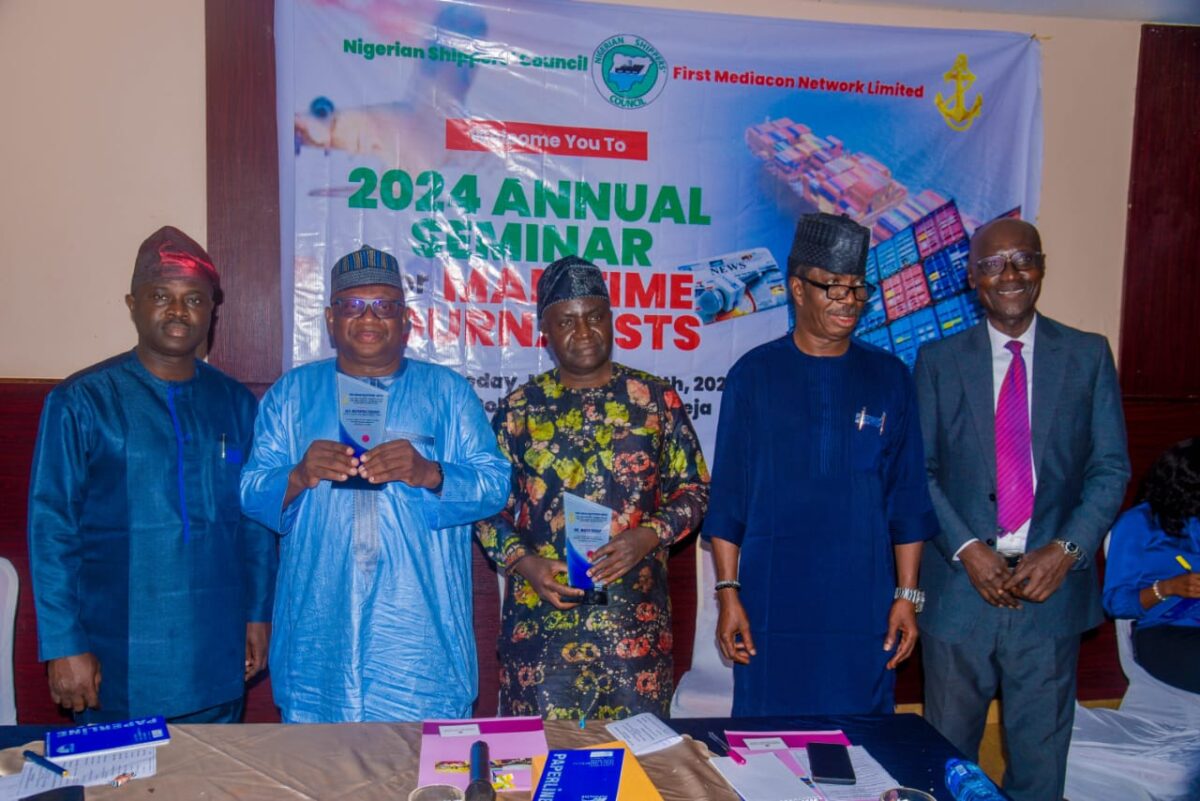
Ahead of the passage of the Nigerian Shipping and Port Economic Regulatory Agency Bill, the Nigerian Shippers’ Council (NSC) is rallying support for a legislative overhaul to transition into a more powerful regulatory agency. This call underscores the Council’s ongoing evolution from a shipper-focused entity to a critical regulator in Nigeria’s maritime sector.
Speaking at the 2024 Annual Seminar for Maritime Journalists, themed “The Nigerian Shippers’ Council in Transition: Issues, Prospects, and Challenges,” the Council’s Executive Secretary; Mr Pius Ukeyima Akuta, represented by Alhaji Mustapha Zubairu, Director of Special Duties, highlighted the necessity for a new legal framework.
The proposed bill, already passed by the House of Representatives and awaiting Senate concurrence, seeks to repeal the Nigerian Shippers’ Council Act and establish the Nigerian Port and Shipping Regulatory Agency Act.
Akuta emphasized that the new law is pivotal to streamlining port processes and enhancing efficiency. According to him, the NSC has undergone several phases of transformation: from protecting shippers’ interests in international trade to promoting Inland Dry Ports (IDPs) and logistics hubs across Nigeria, and eventually assuming the role of Port Economic Regulator in 2014.
He explained that the proposed legislation is more than a mere upgrade; it is a strategic move to reposition Nigeria’s ports as hubs of competitiveness in global trade. “The Port Economic Regulation Bill, once passed, will equip the Council with the authority needed to enforce regulations, reduce inefficiencies, and promote fair competition within the sector,” Akuta noted.
He outlined the prospects tied to the new bill, which include the implementation of the Cargo Tracking Note to enhance transparency and revenue generation, an Enterprise Management System aimed at fully digital operations in the maritime sector, green shipping and sustainability initiatives to align Nigeria’s ports with global environmental standards, and enhanced port access and automation to resolve longstanding challenges such as bottlenecks and checkpoints.
“These changes will bring holistic transformation to port operations,” Akuta declared. “The NSC is poised to address issues such as labor instability, poor infrastructure, and process inefficiencies, making the sector more competitive and aligned with international best practices.”

Adding to the discussion, Mr. Sesan Onileimo, CEO of First Medicaon Network Ltd and the facilitator of the seminar, described the bill as a “game-changer” for Nigeria’s port and shipping ecosystem. He lamented the current low ranking of Nigeria’s ports in ease of doing business, attributing it to outdated regulatory frameworks and inefficiencies.
“The new law will introduce fairness and competition in pricing services while providing users and operators with an improved business environment,” Onileimo remarked. He praised the NSC’s leadership for its commitment to driving the bill forward, calling it a bold step toward repositioning the Council and revitalizing the maritime sector.
The NSC’s push for this legislative transformation reflects its broader ambition to become a central driver of Nigeria’s economic growth through effective regulation. With the maritime and logistics sectors rapidly evolving, the Council is leveraging this momentum to solidify its role as a catalyst for progress. As the nation awaits Senate approval of the bill, stakeholders are hopeful that this legislative milestone will unlock new opportunities, ensuring that Nigeria’s ports and maritime operations remain competitive in an increasingly interconnected global economy.
Speaking also, the chairman of the occasion and Chief Executive Officer of the Centre for the Promotion of Private Enterprise (CPPE), Dr. Muda Yusuf, lamented the lack of significant records for maritime activities from the National Bureau of Statistics (NBS), adding that the bureau has failed to provide updated information about the industry.
Yusuf, a former Director General of the Lagos Chamber of Commerce and Industry (LCCI), called on the NBS to focus more attention on the maritime industry because of the sector’s contributions to Nigeria’s Gross Domestic Product (GDP).
According to him, the available data on the maritime sector reflecting its contribution to the GDP in the quarter under review does not accurately reflect the sector’s performance. He urged the Bureau to improve its data analysis of the industry to ensure its true contributions to the economy are captured.















